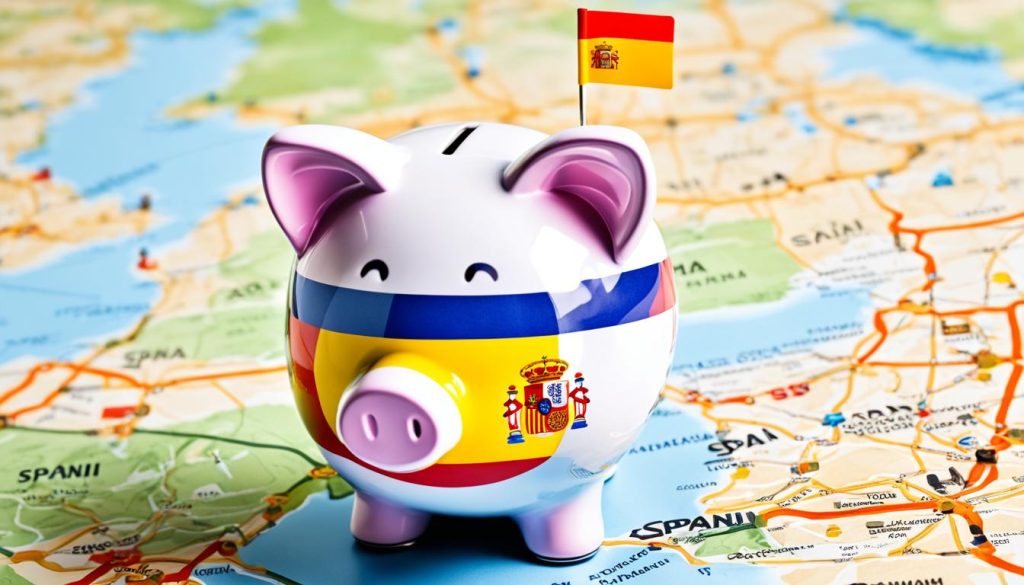Spain has a variety of banking institutions, such as local banks and international ones, including savings banks (cajas), and credit cooperatives. For people moving to Spain and investors from abroad, it is crucial to understand how banking works here. Knowing what unique services you can get and following Spain’s banking rules is key for getting settled financially. The Bank of Spain makes sure everything runs smoothly, respecting the financial laws.
This guide is perfect for anyone looking to manage their money well in Spain. It aims to help you fit into Spain’s financial system without any trouble.
Key Takeaways
- Spain’s banking system includes a mix of local and international banks, cajas, and credit cooperatives.
- Expatriates must navigate unique banking services and regulations in Spain.
- Financial integration in Spain is facilitated by understanding the operations overseen by the Bank of Spain.
- This guide offers crucial advice for effective financial management in Spain.
- Seamless integration into the Spanish economy involves awareness of stability and monetary policies.
Introduction to the Spanish Banking System

If you’re thinking of diving into Spain’s financial scene, it’s essential to know how its banking system works. This part gives you a detailed look at the banking options in Spain. It explains the important part they play in financial regulations.
Overview of Banking Institutions
In Spain, you’ll find a blend of different banks, including local and international ones, plus savings banks called cajas, and credit co-ops. They offer a wide range of services for both individuals and businesses. Spanish banks are well-known for their broad services. They handle everyday banking and more specific financial needs.
The Role of the Bank of Spain
The Bank of Spain keeps the country’s banking sector in line. It makes sure monetary policy is stable and banking rules are followed. This institution is key to keeping the banking system safe and running smoothly. It also teams up with the European Central Bank to match up with wider financial policies.
Types of Banks in Spain
Spain has several bank types, each with its own focus and customers:
- Local Banks
- International Banks
- Savings Banks (Cajas)
- Credit Cooperatives
In Spain, these different banks meet a wide range of financial needs, from personal to big business banking. Every bank follows strict rules set by the Bank of Spain. This ensures they all meet high standards.
Preparing to Open a Bank Account in Spain

Starting the process to open a bank account in Spain requires some steps. You’ll need to know what documents to gather. This makes the experience of opening an account easier.
Necessary Documentation
To open a bank account in Spain, you need several important documents. These include:
- A valid passport or national ID card.
- Proof of residence, like a rental agreement or utility bill.
- Your Foreigners’ Identification Number (NIE) for tax reasons.
Steps Involved in the Process
After gathering your documents, you can start the banking process. Here’s what to do next:
- Researching and comparing services: Look at different banks and what they offer to find one that suits you.
- Visiting bank branches: Meet with banks to talk about their services and the types of accounts they have.
- Understanding account types: Get to know the different accounts, like current and savings accounts, and ones for expats.
Opening a bank account in Spain might feel daunting. But, having the right documents and following the steps makes it easier. It’s important to research and compare banks to find the right one for you.
Choosing the Right Bank in Spain

Looking for a bank in Spain requires thinking about a few key things. You’ll want to look at their reputation, what services they provide, their fees, and how easy it is to get to their branches. This helps make sure you pick a bank that meets your needs.
Factors to Consider
To pick the best bank in Spain, consider several important points. These include the bank’s reputation and the variety of services it offers. Also, compare different banks’ fees and how easy it is to find their ATMs and branches if you travel a lot.
- Reputation: Choose banks known for good service and positive feedback from customers.
- Service Range: Look for banks offering a wide array of services, from day-to-day banking to more specialized products.
- Fees: Check out their charges for maintaining your account, making transactions, and sending money abroad to find a bank that won’t cost you too much.
- Geographical Accessibility: Make sure the bank has branches and ATMs close by, especially important if you’re often on the move.
Popular Banking Options
A few Spanish banks stand out because of their great services for both locals and expats:
- Banco Santander: Known worldwide, offering lots of branch locations and diverse financial options.
- BBVA: Stands out for its digital banking services and innovative solutions.
- CaixaBank: Provides a wide range of services for personal and business banking.
- Bankia: Offers competitive fees and banking plans tailored to individual needs.
By weighing these factors, you can choose a Spanish bank that fits your lifestyle. This way, picking a bank becomes easier and more rewarding.</gt;
Finance and Banking in Spain

Getting used to Spain’s financial environment can be easy with the right bank plan. It’s important to know the unique aspects of the Spanish banks. These include their services and rules for better money management in Spain. Spanish banks offer many services for both outsiders and residents.
For those moving to Spain, banks offer great online banking services. This makes it easier and safer to handle money. Banks like Banco Santander, BBVA, and CaixaBank are known for their services for everyone.
Also, new tech in online banking has changed how we do banking. It makes living in Spain and managing money easier. Whether it’s opening an account, making transactions, or finding investment options, Spanish banks have what you need. Using these services means you can easily keep track of your money in Spain.
In summary, knowing and using Spanish banking services is key for those moving to Spain. It makes managing money simple. This helps achieve better financial stability and integration in Spain.
Types of Bank Accounts in Spain

When you move to Spain, you’ll find many ways to handle your money. There are various bank accounts designed for different needs. This makes it easy for you to pick the one that fits you best.
Current Accounts
Current accounts, or ‘cuenta corriente’, are for your daily banking needs. They let you pay bills, shop, and get cash from ATMs. Banks in Spain also offer services online and on mobiles. This makes current accounts very easy to use.
Savings Accounts
Want to increase your savings? Savings accounts, called ‘cuenta de ahorro’, are a good choice. They keep your money safe and let it grow with interest. You can pick from many savings accounts. They all offer competitive rates to help your money grow faster.
Payroll Accounts
Payroll accounts, or ‘cuenta nómina’, are made for getting your salary. These accounts give you special benefits like lower fees and higher interest rates. They also have some exclusive offers. A Spanish payroll account makes getting and managing your salary easier.
The Benefits of Having a Spanish Bank Account

Having a Spanish bank account offers many benefits for both expatriates and non-residents. Whether you’re in Spain for a short time or planning to stay, a local bank account helps with everyday money tasks.
Financial Convenience
With a local Spanish bank account, managing your money becomes much easier. You can pay for day-to-day expenses, utility bills, and buy things locally without worrying about international fees. Also, most banks offer online banking, making it easy to manage your funds from anywhere.
Property Ownership
If you’re buying property in Spain, a local bank account makes things simpler. It helps with getting a mortgage, paying property taxes, and other payments. For non-residents wanting to invest in property, it gives easy fund access and better financial deals.
Salary Deposits
Expatriates working in Spain find a local bank account crucial for getting their salaries on time and correctly. It not only makes dealing with money more efficient but also meets job requirements set by Spanish companies. This makes getting paid both straightforward and safe.
International Banking Services for Expats

Living in Spain as an expat is exciting but involves complex financial management. Understanding the banking options for expats in Spain is essential. These services are designed for global residents.
Foreign Currency Accounts
For expats handling different currencies, foreign currency accounts are crucial. They let you keep, transfer, and swap currencies easily. Banks like HSBC and Citibank offer these accounts, meeting the specific needs of Spain’s expats.
International Money Transfers
Sending money across borders easily is important for expats. It’s key to find a service that’s reliable and doesn’t cost a lot. HSBC and Citibank in Spain offer secure, fast, and affordable transfer services.
Multi-Currency Cards
Multi-currency cards are vital for expats who travel often or do business internationally. These cards save you from high conversion fees and bad exchange rates. Major Spanish banks have multi-currency cards, making spending abroad easy and convenient.
Understanding Bank Fees and Charges

Banking in Spain has costs that everyone needs to know. Learning about these fees helps with smarter money management. It also aids in making choices that save money.
Monthly Account Maintenance Fees
One usual cost is the monthly account maintenance fee. Banks may charge you each month to keep your account running. This fee varies by account type and what’s included. Look at different banks to find a cheaper choice.
ATM Withdrawal Fees
ATM withdrawal fees are another common cost. Some banks offer free withdrawals up to a limit every month. Others may charge you for every withdrawal, especially at ATMs not in their network. To cut down on these charges, plan your cash withdrawals. Or find banks that offer more free withdrawals.
Currency Conversion Fees
When dealing with foreign transactions, watch out for currency conversion fees. These apply when you need to change currencies, like during travel or online shopping from abroad. To reduce these fees, look for accounts or cards with better conversion rates or lower international fees.
Being aware of these charges helps you manage your Spanish banking costs better. It opens up ways to benefit financially.
Language Support and Customer Service

Finding banks with great customer service and English support is key for expats in Spain. These services make banking easier and clear up any language issues. It helps expats have a smooth banking experience.
Banks with English-Speaking Staff
Leading Spanish banks, like Banco Santander and BBVA, provide English services. They have English-speaking staff to help expats with their banking needs. This way, expats can manage their money easily.
Dedicated Services for Expats
Spanish banks don’t just stop at language help for expats. They also offer special financial solutions, like multi-currency accounts and online banking in English. These services help expats easily fit into Spain’s financial system.
Online and Mobile Banking in Spain
The rise of digital banking services in Spain has changed the way people handle money. Banks now use new technology for better service. This means everyday banking tasks are simpler and you can manage your money from afar easily.
Digital Transformation in Spanish Banks
Traditional banks in Spain are becoming more digital. They’re spending a lot on technology to improve online and mobile banking. This has made digital banking services more reliable, making customers happier and bank operations smoother.
Popular Mobile Banking Apps
Many Spanish mobile banking applications are popular for their easy use and great features. Some leading ones include:
- Santander’s “Santander Mobile”
- BBVA’s “BBVA España”
- CaixaBank’s “CaixaBankNow”
- Bankia’s “Bankia Online Mobile”
These apps let users do a lot, like making payments, checking balances, and managing investments on the move.
Managing Finances from Anywhere
Remote financial management draws in expats and locals alike. You can pay bills, move money, or keep an eye on your savings with Spanish bank apps. This saves time and gives you control and reassurance about your money.
Finally, the move towards digital banking services in Spain shows how key innovation is in banking today. With Spanish mobile banking applications, users can efficiently take care of their finances safely, wherever they are.
Key Players in the Spanish Banking Sector
In Spain’s banking scene, some banks lead by offering many services and having a big global reach. Among the leading Spanish banks, Banco Santander, BBVA, and CaixaBank are crucial. They are popular with locals and those from abroad because of their varied services.
Banco Santander is a huge name worldwide, with branches in many countries. It’s not just a top player in Spain’s financial scene. It also has a massive impact globally, offering lots of services for different customers.
BBVA is another key player in the Spanish banking sector. It shines in making banking easy online, which benefits both personal and business customers. Its focus on tech and user-friendly services makes BBVA stand out among financial industry leaders in Spain.
CaixaBank is known for putting customers first. It provides many services, from everyday banking to more complex financial needs. Its dedication to being the best ensures it’s among the top respected and leading Spanish banks.
Together, these banks show the strength and variety of Spain’s banking sector. They offer solid financial solutions that attract a wide range of customers. With their classic and innovative digital services, these financial industry leaders in Spain push the sector ahead, setting high standards for others.
Regulations for Banks in Spain
Spain’s banking rules aim to keep things stable and safe for everyone. They follow guidelines set by the European Central Bank (ECB) and the Bank of Spain. We’ll see how these rules influence Spain’s banking scene.
European Central Bank Regulations
In the Eurozone, Spain must stick to the ECB’s rules. This means they have to follow certain monetary policies. These rules help keep the financial system stable in all member countries. Spanish banks have to meet specific standards to operate safely and effectively.
Consumer Protection Measures
Keeping consumer banking safe is key in Spain. The Bank of Spain works with the ECB to protect customers. They enforce laws for transparency, fight against money laundering, and combat fraud. Thanks to these efforts, banks in Spain work hard to gain and keep your trust, ensuring a secure banking experience.
Seeking Professional Financial Advice
If you’re living abroad in Spain, getting advice from financial pros is key. They can offer you customised solutions for your unique needs. This makes adjusting to Spain’s money matters a lot easier.
Importance of Financial Advisors
A financial advisor can guide you through Spain’s complex bank system. They know all about investments and the law. This means you can make smart choices that fit well with rules both in Spain and globally.
With their help, you can protect and even increase your money. They’re really good at offering financial advice in Spain.
Tax Planning and Optimisation
Understanding taxes in Spain is also crucial. Good financial advisors are great at tax advisory services. They help you get the most out of deductions and credits. This way, you can pay less tax while sticking to Spanish laws.
Having an expert to advise you makes moving your finances to Spain easier. They’re a big help for anyone from another country.
Exploring Investment Opportunities in Spain
Spain is a prime spot for investors wanting to grow their money. It has a lot to offer, like real estate, agriculture, and the stock market. These options can help investors spread out their investments.
Real Estate Investment
The real estate market in Spain is booming, especially in big cities. Places like Madrid and Barcelona are great for buying property. Investors see good returns through rent and the rising value of their properties.
Agricultural Investment
Investing in agriculture in Spain can be very rewarding. The country is famous for quality crops. Projects like almond farms are not only profitable but also good for the environment.
Stock Market Investment
Spain’s stock market is another great choice for investors. It offers a wide variety of sectors to invest in. The IBEX 35 index lists many companies, making it easier to diversify and possibly make more money.
Special Services for Non-Residents
Non-residents planning to manage their finances in Spain can find many banking services just for them. These services are tailored to meet their unique needs. They make navigating Spanish banking clearer for non-residents.
Non-Resident Bank Accounts
It’s easy to open a bank account in Spain if you’re not a resident. These accounts are handy for various reasons, like dealing with different currencies and making buying property easier. First, you must gather the right information on how banking for non-residents works in Spain.
Non-resident accounts usually have flexible terms. They help with financial management while following Spanish rules.
Proof of Non-Residency Requirements
To open a non-resident account, you need to show you’re not a Spanish resident. You’ll need things like a valid passport, a home country address proof, and a non-resident certificate from Spanish authorities. Banks might ask for different documents, so it’s wise to check with yours.
These banking services help non-residents easily fit into the Spanish financial system. They ensure access to crucial services for handling money.
Top Tips for Expat Banking Success in Spain
Understanding banking in Spain is about making smart decisions. Here are top suggestions for expat banking triumphs.
Choosing the Right Account Type
Picking the right account matters for your money management. Think about access, costs, and services before deciding. Expats often go for current, savings, or international accounts.
Staying Informed About Fees
Knowing about fees can prevent surprise costs. Watch out for monthly fees, ATM costs, and currency charges. This knowledge is crucial for managing your money wisely.
Utilising Digital Banking Tools
Use online and mobile tools from Spanish banks. They offer convenience for managing money, making payments, and getting alerts anywhere. Digital tools are essential for good financial management.
Understanding Spanish Tax Identification Numbers
Getting a Spanish NIE (Número de Identificación de Extranjero) is vital for foreigners who want to work or live in Spain. It’s often needed for various transactions and legal matters in the country.
The NIE – Número de Identificación de Extranjero
The NIE is a unique code given to non-residents and expats for tax matters in Spain. It’s needed for things like buying property or starting a business. The Spanish government issues it, and it stays valid for your whole stay or until all related tasks are done.
How to Obtain Your NIE
Getting your tax number in Spain involves a few simple steps:
- Go to a specific National Police Station or Spanish consulate.
- Fill out the necessary form (EX-15).
- Show the documents needed, like a valid passport and reason for the NIE.
- Turn in your application with the fee, if required.
You can also get someone to apply for you. This is handy for those outside Spain or if you find Spanish paperwork tricky. The NIE is key for legal living in Spain and helps you join its economic and social life smoothly.
Conclusion: Your Financial Journey in Spain
Starting your financial life in Spain is very important. It helps you become stable in the country. You need to get the hang of Spain’s money system. This way, you can use banking services that fit what you need. Choosing the best bank and knowing the rules is key. Also, using online banking can help a lot.
We have covered lots about banking in Spain in this guide. We talked about different bank accounts you can open. And we looked at Spain’s main banks and the Bank of Spain’s role. With this knowledge, managing your banking needs becomes easier. This means you can use financial services better and make smart choices.
Also, you can grow your money in Spain by exploring investment chances. And there are special services for people from other countries. This full plan makes moving into Spain’s economy smoother. It also helps you build a good financial future. Follow these suggestions to start your money journey in Spain with confidence and clear direction.







